The School of Rock
 for some rude humor and drug references.
for some rude humor and drug references.
Reviewed by: Rosemarie Ute Hoffman
CONTRIBUTOR
| Moral Rating: | Offensive |
| Moviemaking Quality: |
|
| Primary Audience: | Adults Mature-Teens |
| Genre: | Music Comedy |
| Length: | 1 hr. 48 min. |
| Year of Release: | 2003 |
| USA Release: |
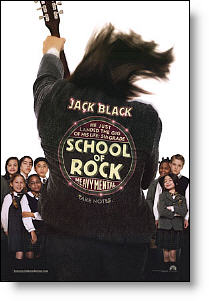
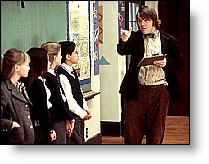
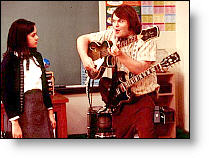
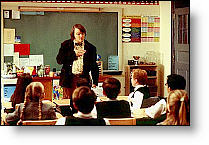
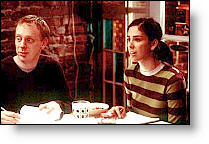
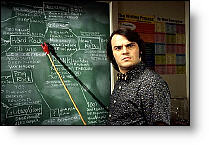

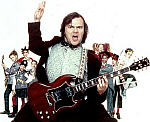
Are we living in a moral Stone Age? We hear a lot today about how Johnny can’t read, how he can’t write, and the trouble he is having finding France on a map. It is also true that Johnny is having difficulty distinguishing right from wrong. Answer
How can I know what is right and what is wrong? Answer
“Do not love the world or the things in the world. …For all that is in the world; the lust of the flesh, the lust of the eyes, and the pride of life; is not of the Father but is of the world. And the world is passing away, …but he who does the will of God abides forever” (1 John 2:15-17).
“The fruit of the Spirit is love, joy, peace, longsuffering, kindness, goodness, faithfulness, gentleness, self-control…” (Gal. 5:22-23).
“Seek first the kingdom of God and His righteousness…” (Matt. 6:33).
What does God expect of me? Answer
In a world where we are continually let down, we can totally rely on, trust in, count on God’s promises. He will never, ever, let you down. Learn more
If God knows I am hurting, why doesn’t He help me? Answer
| Featuring |
|---|
| Jack Black, Joan Cusack, Sarah Silverman, Mike White, Joey Gaydes |
| Director |
|
Richard Linklater |
| Producer |
| Steve Nicolaides, Scott Rudin |
| Distributor |
“The School of Rock” features Dewey Finn (Jack Black), a rock and roll legend in his own mind. He will do anything and con anyone into his web of deception as he masterfully attains the ultimate—competing in the “Battle of the Bands.”
Screenwriter Mike White along with the director Richard Linklater, successfully introduces a theme of youth rebellion—exploring generational morals. They take a mild-mannered brood of young well-educated and gifted prodigies, and transform them into cussing, passionate, driven children.
Dewey has been free loading off his friend Ned Schneebly (screenwriter Mike White) since the days of performing in their “garage band.” They room together with Ned’s overbearing girlfriend, Patty (Sarah Silverman), who incessantly degrades Dewey. Even so, he continues to chase his dream of being a rock star as the lead guitarist in a band he brought together. Conversely, Ned is a substitute teacher and lacks both backbone and wishbone. Unfortunately, Dewey’s days are numbered. His roommates demand back rent and the band votes him out. Despite the trials, Dewey is committed to falling with dignity—never selling out. He puts his failures behind and focuses on his dreams—they all will be funny little footnotes in the end.
While Dewey tries to sell his guitar over the telephone unsuccessfully, he answers a call for Ned from Principal Mullins (Jan Cusak) of Horace Green Preparatory. She is looking for a substitute to replace an absent, injured teacher. Without much thought, Dewey decides to impersonate Ned to quickly solve his financial woes. He accepts the offer to teach 4th grade at the uptight private school that adheres to a strict code of conduct.
Dewey soon finds out the students are conservative, fearful and caught up with Horace Green’s system of recognition and demerits. On the second day of the job, and at a student’s request to learn, Dewey tells them, “You should give up. Quit! Yes, you could try, but in the end you will just lose because of ‘the man’.” He further recounts who “the man” is—anyone in authority. Dewey concludes the lesson with, “You could once stick it to “the man” through rock and roll.”
While lurking in the hallway during a music class, Dewey discovers that his students study classical music. As usual, he manipulates someone else’s potential to his advantage—no matter the cost. Through deception, he convinces the children to cooperate in the school project “rock band.” He quickly determines each student’s prominent talent and assigns each one to a specific task. Though a handful were in the band, others were assigned as back-up singers, roadie crew, security and groupies—all are included.
As the project begins Dewey shares his convoluted theory with a student who is an outcast, telling him he is “cool” if he rocks in a band. He also instructs the groupies on their responsibilities, which includes worshiping the band, and then leads the class in a rendition of “Pledge of Allegiance to the Band.”
Later in a music exercise, Dewey tries to poke at their hidden resentments and passions by using anger as a tool; he asks them, “What makes you mad?” He further encourages them to break the rules and to get mad at “the man.”
Dewey’s schemes are not limited to the students, but include the principal as well. He invites her out for coffee, and they end up in a jukebox joint that only serves beer. Dewey needs to convince her to make an exception and authorize an educational field trip with his class. He uses a powerful mixture of alcohol and a Stevie Nicks tune to persuade her.
Before long, Dewey has the whole class participating in some unethical activities of lying and deceiving through lookouts using the Internet. Similarly, after being denied an audition for “Battle of the Bands,” a student makes up a cunning story deception—claiming that they are from a children’s hospital with a terminal disease. The stunt works, and they are included on the roster.
On Parent’s Night at Horace Green things turn for the worse. Dewey’s gig is up when they find out that he is an imposter. However, the children take matters into their own hands and collectively decide to go through with the audition. They even arrange for the bus driver to pick up Dewey where he lives. While still in bed, Dewey is confronted by a few children. He confesses that he is a loser, but the children insist. He apologizes for using them and says he has learned there is no “I” in team.
Before going on stage (with parents, principal and Ned in the audience), the band says a prayer to the “God of Rock” with a bare-chested-cross-tattooed, undulating man in the background. As they rock out, skull and cross bones appear in their video accompaniment. Though the audience preferred their act, the better-looking band is announced the winner.
Breaking the rules while following passion to pursue dreams can be destructive. Never use the end to justify the means. Problems or trials help us to endure, endurance develops strength of character, and character strengthens our confidence in the expectation of dreams coming true.
Violence: None | Profanity: Moderate | Sex/Nudity: Minor


[Good / 4]
However, I was dismayed at the amount of crude language freely uttered by the children. On several occasions, the fourth graders belt out profanities that I would take serious issue with had any of those kids been mine. (Although to their credit, they never get worse than typical “PG-13” profanities.) They also use a fair amount of deception and rebellion to achieve their ultimate goal. This, I don’t believe however, was done with any kind of malice or potentially destructive behavior in mind. I chalked it up to them just being typical kids. Anyone gun-shy about watching a movie with lots of classic rock and children using mild profanities may not want to view this movie. It is a must see for everyone else.
[Somewhat Offensive / 4]
[Good/4]
Another aspect of this movie that bothered me… was the role of Billy, the groups “stylist.” The role was played by Brian Fuldato. The kid gave such a good performance that its hard to determine if he is really as ditsy as he portrayed or if he was just acting. I hope that he was just acting. I also hope that the poor kid is not the object of mocking or ridicule in his social and personal life. What bothered me is how Hollywood is now casting children in roles that, in my opinion, rob these kids of their innocence. Children have enough to contend with growing up in today’s world, and I feel that we, as adults should not bring controversial, adult issues into their lives, in any way. Children need to be focused on learning and developing, on having their dreams and doing what they have to do in order to achieve them. Most importantly, children need a solid foundation of faith in God. There seems to be a moral vacuum in our society where relativism rules the day.
The charactrer “Billy” aside, I hope that young Brian Fuldato is not experiencing any adversity in his life as a consequence of the role he played. It’s the real kids that matter after all. I apologize for going on a bit of a tangent here, but as a Christian I wanted to share what was on my heart. God Bless.
[Average/2]
[Average/3]
[Very Offensive/3]
[Average/1]
[Extremely Offensive/3]
[Better than Average/4]
[Very Offensive/2]
[Good/5]
[Better than Average/3]
[SLIGHTLY Objectionable / 4]
[Better than Average/3]
[Better than Average/5]

My Ratings: [Somewhat Offensive / 4]